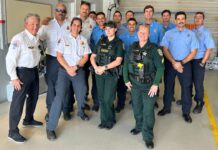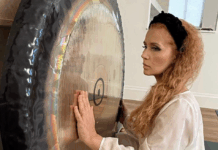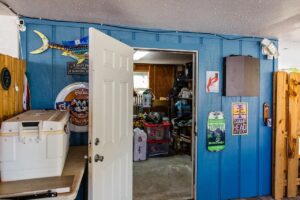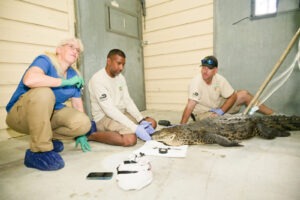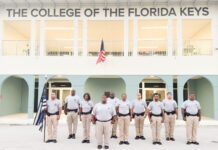Last week, 11-year-old Sofia Figueredo stood at a table in her family’s kitchen, harvesting the honey from the beehives on their Islamorada property. Her mother, Elizabeth Jolin, was by her side, ready to help.
With a hot knife, Sofia gingerly scraped honey and wax from a wooden frame taken from a hive, a procedure known as “uncapping.” The golden syrupy mixture plopped into a pan below the frame, soon to be put into an extractor to separate the honey from the wax with centrifugal force.
Elizabeth looked at their visitor with a smile, her eyes wide. “You’ve got to try this. It’s amazing,” she said, pointing at the freshly harvested honey in the pan. She licked her finger. “I swear, whenever we do this, I want to make biscuits.”
Scooping up the sticky fluid with fingers for a taste, the honey was sweet, buttery, woodsy and vanilla-y, and it was still warm from the sun. It was so outrageously delicious, we gasped.

“Isn’t it good?” Elizabeth asked rhetorically.
“Look, hold this,” Sofia said, excitedly. She lifted a frame from the extractor, showing the difference in weight between a frame with honey on it and without it. “See how heavy it is?”
Yes, we do. And consider us hooked. Can we get a beehive too?
That’s how infectious Sofia’s enthusiasm for beekeeping is: It’s entirely possible that if you let her show you how to harvest honey, you’ll get bit by her bug. Or perhaps, “stung” is a better word.
In fact, Sofia is so into her hobby that it has become a modestly profitable side hustle, with money raised from her honey products going into a college fund.
About four years ago, Elizabeth was the first one in the family who became interested in getting a hive, after they visited an 80-year-old beekeeper friend in Washington, D.C.
“We thought, ‘If she can do it, we can do it,’” she said with a laugh, looking at Sofia.
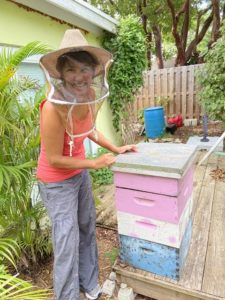
Sofia nodded her head in agreement. “Mom got the bees first, then I became interested,” she said, explaining that it’s hard work. She has gotten stung many times, and it’s hot wearing that protective bee suit in the Florida Keys sun.
So why do it?
“Because it’s cool! I’m fascinated. And the honey is good,” Sofia said, her words spilling out excitedly. “We couldn’t live without bees. Bees pollinate everything. And one bee produces one teaspoon of honey in its lifetime. That is so amazing. The queen mates with a drone, and the queen is the only bee that lays eggs. The bees all have different jobs — drones, workers, guards and nurses. And the majority of bees are female, and they do most of the work.”
Which is the inspiration for the name of Sofia’s business: Ms. Behave Honey. The tagline? “Girl Powered Honey,” of course.

Elizabeth bought their beginning hive kit from South Florida Bee Supplies. But she says that they couldn’t have gotten started without the help of their “bee mentor,” a local friend who passed along hard-earned knowledge, which is a traditional way to learn about beekeeping.
Sofia began taking the family hobby seriously in 2018, when she created a honey-product business for a local entrepreneurial contest called Keys Kids Business Faire, co-hosted by Island Christian School and an organization called Brainery. The first-place prize was $1,500 in scholarship money. Sofia nailed it, and her grandmother was so impressed that she told Sofia she would match that prize as well as any other earnings from her business for a college fund.
But it’s clear that both mother and daughter share this passion. They finish each other’s sentences while discussing the ins and outs of beekeeping.
“The mosquito sprayings kill bees. They are toxic to mosquitoes, but also to dragonflies and bees and butterflies,” Elizabeth says.
“We try to cover the hives when they spray,” added Sofia. “Sometimes you find tons of bees lying on the ground, it’s so sad.”
Indeed, according to the Miami Herald, “Aerial spraying of the controversial pesticide naled definitely kills mosquitoes, as it has for decades in the Florida Keys. Naled also kills bees caught outside the hive along with many other beneficial insects, say Keys beekeepers.”
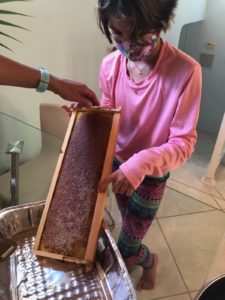
“It brings up the conversation about what we’ve done to live on this planet,” said Elizabeth. “We have to ask the question: What tradeoffs are we making? This is driven home when we’re beekeeping.”
And the duo takes care to emphasize that while a college fund for Sofia is a great bonus, in the end they are having fun just learning about bees.
To that end, Elizabeth is happy to answer any reader inquiries about beekeeping. To ask questions or to order some honey, email elizabethjolin@bellsouth.net. A Teddy bear of honey is $3, a jar is $6, and a pound is $13. Supply is limited by what Sofia harvests every four months, so customers may have to go on a waitlist.







